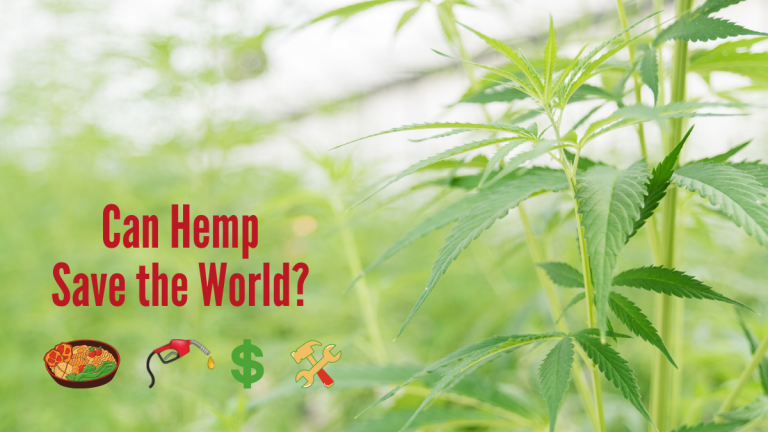Guest Post: Can Hemp Save the World?
Words by Akeem Gardiner, LLB of Canurta Inc.
Limited Resources
Civilization and the natural world are in trouble, and hemp is a potential solution.
Available resources for necessities such as food, medicine, clothes and living spaces have come under threat thanks to significant population growth. We see the signs around us with increasing prices, overreaching demand, mounting back orders and unavailability of many necessities. In finding sustainable natural resources, humanity is actively interested in multifunctional crops as the answer to our growing demands.
A New Solution
Industrial hemp is rising to the challenge as a strong contender, simultaneously offering a unique business opportunity. According to a peer-reviewed publication for environmental science and pollution research, this highly resourceful plant is gaining attention because of its fast growth and commercial applications.
Industrial Hemp
According to a peer-reviewed abstract for ScienceDirect published in 2021, industrial hemp is one of the most ancient and multipurpose crops cultivated in the world. While it belongs to the more commonly known species, cannabis sativa, industrial hemp does not have sufficient quantities of THC to produce intoxicating effects when consumed. The plant, however, has been used for food, therapy, and medicine. Medicinally, it inhibits inflammation, amongst other positive health-impacting attributes.
Benefits of Industrial Hemp
Industrial hemp plants are not just good for food and medicine. They also have several benefits to the environment. To begin with, it’s an ideal carbon sink, meaning it keeps carbon in the ground where it won’t hurt us. Natural environments like oceans and forests capture carbon dioxide and are also carbon sinks. They help keep our environments livable.
Industrial hemp captures more carbon dioxide per hectare than other crops or forests. It reduces or reverses contaminated soils through its root system that penetrates deeply. Third but not least, industrial hemp grown without herbicides or pesticides can be converted for bioenergy production – providing a fuel source that is not as dangerous as current fuel options.

An article for the Journal of Engineering Studies and Research highlights industrial hemp as having more than 50,000 uses. This highly resourceful plant is applicable in food, medicine, construction, consumer products, and fuel amongst other life-sustaining purposes.
The industrial hemp plant can be divided into several parts: seeds, stalk, roots, flowers and leaves. Each part of the plant has various commercial applications. The seeds are helpful in food and cosmetic production and can be cold-pressed to produce oil for cooking and other applications.
Clothing
The stalk is one of the most resilient natural fibres in the world. It can be used in cloth, paper, industrial products, building materials and animal bedding, according to a recent review published in ResearchGate.
Construction Material
The construction industry is a significant energy consumer contributing to approximately 32% of global energy demand, and is responsible for about 30% of energy-based carbon dioxide emissions. Industrial hemp can be used as a sustainable building material alternative for developers to use in residential, commercial and industrial property construction. Industrial hemp building material is two times stronger than traditional building materials.
Carbon Reduction
Hemp is not only a more sustainable alternative – it removes more carbon than it produces and absorbs more greenhouse gases over its lifetime, proving to be an eco-friendly contender. This is important as traditional fuels deplete the ozone layer which leads to global warming. Industrial hemp can lessen our dependability on fuels that create this type of damage.
Hemp Can Save the World
So, can hemp save the world? This versatile, sustainable, economic and environmental crop has various product applications, including food, home, and medicine. While solving many modern problems, it also positively impacts the environment and is an excellent substitute for traditional fuels.
If used mindfully, it can ultimately save the planet.
